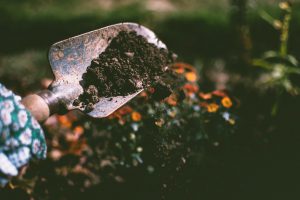Starting a garden? You must start composting. The best thing you can do is provide a rich, nutritious soil for your plants. Anything you grow will come out healthier, more vibrant, and in the case of food, much tastier. This is especially true for the herb grower. Compost piles provide a solution for many of our problems. They help reduce waste, provide growth for healthy plant microorganisms, and are a free, low-maintenance addition to your outside life.

But how do you start one? And what are some do’s and don’ts for keeping it a healthy garden supplement?
Starting Your Compost Pile
The first thing you need to start composting is space outside, find one in a clear and open-air area. If you have pets, you may want to set up a small fence around it so that they don’t go rolling around or eating anything. Also, don’t put anything between your heap and the earth; it needs to be on the dirt. The next steps are as follows:
- Build a base- Like a campfire, it needs a good foundation for airflowTwigs or straw can provide this, plus adding the benefit of drainage.
- Layer – This goes with the Carbon/Nitrogen ratio as explained more below. You want good alternating layers so everything composts evenly. You should also alternate wet and dry materials.
- Add “Green” Clippings – This can be something like clover or grass trimmings.
- Coverage – Your business isn’t the only thing needing coverage! Your heap outside needs at least a tarp over it. This keeps in essential qualities to the decomposition process: moisture and heat.
After starting, your compost pile will need to be turned. Don’t worry though, this process is fairly low maintenance. You can turn with a rake every few weeks. You can sync this to any monthly cycle you have like paying bills or house cleaning. While you do this, mix in more materials keeping to the ratio further explained below.
The Carbon & Nitrogen Ratio

Next, a good rule to start composting is to know your carbon/nitrogen ratio. Basically, you want more carbon than nitrogen. The carbon aspect will be plant-like or “brown” materials that slowly decompose and release a beautiful smell. These are your leaves, wood-chips, and other plant parts. The nitrogen-rich pieces are going to be the usual food scraps and things that might get smelly. You want a two-thirds ratio in favor of the carbon.
Tips: Things NOT to Compost:
- Black walnut leaves
- Fruit peels that may contain pesticides
- Diseased plants
- Manure
- Meat, bones, etc. (They attract pests.)
After a few weeks, you should have rich, beautiful compost to spread in your garden. This can provide an amazing solution for most of your kitchen scraps, and it adds back to the earth in helpful ways. Think about the benefits of having a delicious bounty of vegetables or a beautiful flower garden. People are drawn to vibrant green places. Maybe you can make some new friends using your fresh veggies or pretty flowers?
If you find yourself composting quite a bit, keep in mind that there are compost machines available for the avid gardener. Just do your best and have fun with your little pile of decomposing plants.

